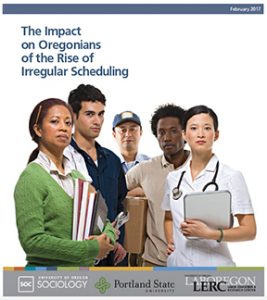 As a part of its Equity in the Economy Initiative The University of Oregon Labor Education and Research Center is excited to announce the release of our report: “The Impact on Oregonians of the Rise of Irregular Scheduling.”
As a part of its Equity in the Economy Initiative The University of Oregon Labor Education and Research Center is excited to announce the release of our report: “The Impact on Oregonians of the Rise of Irregular Scheduling.”
The report was coauthored by UO Sociologist Ellen Scott, Portland State University Economist Mary C. King and former LERC Faculty member, Raahi Reddy. The groundbreaking study reveals the prevalence and experience of irregular scheduling practices in employment for nearly 750 Oregonians. People working in the jobs most impacted by unpredictable scheduling are more likely than the general workforce to have children at home and significant family responsibility for their care.
Key findings include:
- 1 in 6 survey respondents had less than 24 hour notice of their shifts.
- 44% of survey respondents have worked back to back shifts, such as closing one day and opening the next day.
- 73% (499) are expected to have open availability to work to obtain more hours or a better schedule.
- 73% percent of our survey respondents were notified of their work schedule fourteen or fewer days in advance.
- Nearly three-quarters of respondents’ work schedules were subject to change after they were posted.
“Based on our interviews, Oregon workers, especially low-wage workers, lack the predictability and control over work schedules needed to effectively juggle the demands of caregiving, make ends meet each month and explore opportunities to further their education and skills,” said Ellen Scott, of the University of Oregon Sociology Department.
Raahi Reddy said: “Over the past three years, twenty-three state and city jurisdictions have taken up the issue of fair scheduling in some form. As public awareness of the impact of these practices increases so too will the demand for fair scheduling policies that help workers and their families find the stability they need to thrive.”
